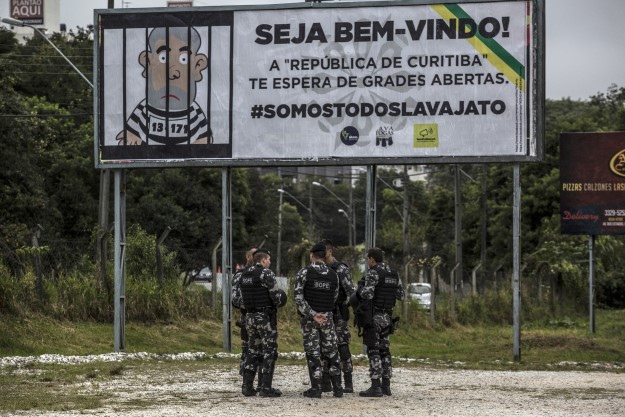Brazil is an astonishing success story when it comes to anti-corruption enforcement – and Operation Lava Jato, or “Car Wash,” is Exhibit A. From anti-money laundering systems to the independence and technical capabilities of law enforcement agencies, Brazil has developed extremely powerful tools in recent years to crack down on graft, far beyond most developing countries.
But one question is rarely asked: Why, despite strong popular support for the operation and the massive cases uncovered by Lava Jato, has Brazil failed to meaningfully improve the rules governing its political system? Why has it not reduced the incentives that led to the rampant bribing and money laundering schemes in the first place?
Indeed, Brazil has been unable to seriously address issues such as campaign finance, lobbying, deficient electoral rules and party transparency. Brazilian politicians face unrealistic demands to fund campaigns. There are virtually no rules governing how private agents interact with public officials, including lawmakers – and of course they interact all the time. Plus, distorted electoral rules still lead to enormous fragmentation in legislative chambers, contaminating coalition-building efforts and favoring the existence of political parties with no clear ideology or program.
It doesn’t have to be this way.
If we look around Latin America we find examples of countries that, following corruption scandals, managed to improve the rules of the game. Chile is one clear case. From late 2014 to early 2015, Chileans were confronted with two campaign finance scandals that tainted all major parties and an influence peddling case involving then-President Michelle Bachelet’s son. With confidence in the political system plummeting, Bachelet instituted a presidential commission to propose reforms and key leaders in Congress embraced the idea. From 2016 to 2018, Chile passed 13 major pieces of legislation in Congress touching a variety of related issues – including campaign finance, party transparency, market regulations and election oversight.
Peru is another example. With all his living predecessors facing corruption accusations, President Martín Vizcarra has successfully imposed an ambitious – and highly popular – anti-corruption agenda despite fierce opposition from fujimoristas in Congress and powerful elements in the judiciary. Vizcarra submitted to a popular vote four constitutional reforms, partially reforming the judiciary, improving parties’ financing laws, vetoing re-election for lawmakers and re-establishing a bicameral Congress; 80% of Peruvians voted for his plan.
The Chilean and Peruvian cases share one key lesson: When scandals mobilize society and bring the issue of corruption to the forefront, leadership is essential to seizing the opportunity and imposing measures to improve the system. Any meaningful anti-corruption reform involves key groups surrendering part of their power – from political parties submitting to stricter transparency and financing rules to companies abiding by enhanced compliance requirements or judges falling under increased oversight. Systemic corruption scandals create a window of opportunity for rapid improvement of institutions (akin to what economists Darren Acemoglu and James Robinson call “critical junctures”). But as the Chilean and Peruvian cases clearly show, someone needs to lead the process. Leadership is a precondition to reduce incentives for corruption.
Brazil, by contrast, did not have a leader with the political will, ability or credibility to impose an ambitious anti-corruption program during the first five years of Lava Jato. Former President Dilma Rousseff lacked the desire, capacity and support to launch a reform program. Her succesor Michel Temer did not enjoy the legitimacy of direct elections and was too unpopular and contaminated by Lava Jato itself. As an anti-establishment candidate, Jair Bolsonaro masterfully weaponized the issue of corruption to win the election last year. But he never proposed a plan to improve institutions, instead portraying the problem as a phenomenon restricted to his enemies, particularly on the left.
The last hope for reforms could have been Sérgio Moro, the Lava Jato federal judge who became Bolsonaro’s justice minister. Moro, after all, justified his decision to enter Bolsonaro’s cabinet as a move to implement a “strong anti-corruption and anti-crime agenda.” He is also the most popular public figure in Brasília nowadays. But 100 days into the Bolsonaro administration, no major reforms concerning the relationship between money and politics, among other crucial topics, are in sight. Moro sent to Congress an all-encompassing “anti-crime package” that, on the issue of graft specifically, is essentially limited to higher sentences for corrupt officials. The legislation initially included treating illegal campaign financing as a criminal offense – a proposal long defended by Moro when he was a federal judge despite a lack of evidence that the “criminalization” would actually serve as a deterrent for corruption, given the deficient regulations in place. In the end, Moro removed the idea from his bill.
In the Bolsonaro era, Lava Jato exists in a different reality. Its targets are not cabinet members or key players in Congress anymore. This could have favored a reform program to curtail the many incentives for corruption plaguing politics. Yet no one in Brasília seems capable of leading the effort. Leadership will have to come from elsewhere – such as civil society. The alternative is to wait until a new corruption scandal tragically opens another window of opportunity for change further down the road.
—
Simon is the head of the AS/COA Anti-corruption Working Group and the politics editor of AQ









